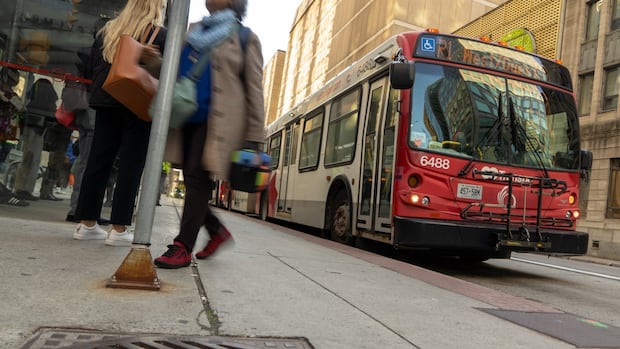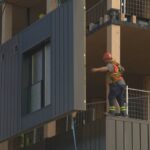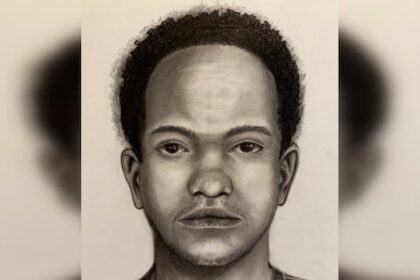OttawaOttawa’s chief financial officer says it will be another tough year for staff building this year’s budget, as council seems set to cap any increase to property taxes at 3.75 per centProperty tax increase likely to be capped at 3.75 per cent, including police and transit leviesElyse Skura · CBC News · Posted: Sep 03, 2025 4:00 AM EDT | Last Updated: 2 hours agoAn R1 bus rolls through downtown Ottawa on Sept. 10, 2024, when camera problems kept trains for running for part of the morning. The next city budget seems set to include a hike to both fares and the transit levy. (Francis Ferland/CBC)As Ottawa is in the midst of a major transit funding shortfall and with council seemingly set to cap any increase to property taxes at 3.75 per cent, the city’s chief financial officer says it will be another tough year for staff building the budget.Members of the finance and corporate services committee voted 9-3 Tuesday to direct staff to follow those 2026 budget guidelines, meaning the average property owner will pay about $166 more per year.That’s despite reservations that won’t leave enough room to cover the sort of hike to the transit levy needed to pay for OC Transpo services as ridership levels fail to increase as quickly as staff had hoped. Mayor asks council to limit next year’s tax increase to 3.75% Police chief says force needs budget boost, but critics disagree “It’s undeniable that transit is the monkey on our backs and I deeply share residents’ frustration with the situation,” said Coun. Catherine Kitts, the committee’s vice-chair. “It’s costing more. We are still struggling with reliability with the bus service delays.” “It honestly feels like we’re trying to solve a maze with no exit.” Orléans South-Navan Coun. Catherine Kitts says funding transit feels like ‘trying to solve a maze with no exit.’ (Michel Aspirot/CBC) Staff have not provided a number for exactly how much money the city needs to save in 2026 to balance the transit budget, but have laid out a list of directions: Increase the transit levy by 3 to 15 per cent; Increase fares by 2.5 to 7.5 per cent; Defer more projects, and; Find “operating efficiencies.” Cyril Rogers, the city’s chief financial officer, said his team will be able to make a balanced budget within those parameters, including any changes to staff compensation that are part of the new tentative agreement with the union representing transit operators. Finding trade-offsLast year, transit shortfalls dominated budget deliberations. To fill a $120-million structural deficit, staff deferred projects, raised the transit levy by 8 per cent, did an overhaul of available passes and raised adult base fares by 5.3 per cent to $4. The changes, which sparked intense pushback, included a proposed 120 per cent hike to seniors passes (which did not go ahead) and the removal of the youth pass (which did). Coun. Glen Gower, who also chairs the transit commission, told CBC that sort of dramatic change is not likely, but it is “fair to assume there will be a little bit of a fare increase.” Stittsville Coun. Glen Gower, who also chairs the transit committee, says raising fares and hiking the transit levy will likely be needed to ensure OC Transpo can provide good service. (Michel Aspirot/CBC)”It’s also fair that we look at our property taxes as well, our transit levy. If we want to continue to have good transit service, we need to fund that,” he said. Despite the changes, which include an overhaul of bus routes, OC Transpo is failing to meet budgetary expectations with Rogers projecting this year’s deficit will grow to $46.6 million by year’s end. Several councillors also noted complaints from residents that seem to suggest riders are already choosing not to take transit.”We just went through the April 27th review that cut basic transit routes in my ward that have left families who do not have vehicles on weekends with no [way to] even leave their house,” said River ward Coun. Riley Brockington.”And you’re telling me we have operational efficiencies that we can cut from the transit budget? I don’t understand.” Brockington said there is “no appetite” to pay more for transit until the quality of service improves.River ward Coun. Riley Brockington says transit users have gone through enough in recent years and won’t accept an increase to fares unless services improve. (Patrick Louiseize/CBC)What’s next?If council also approves these directions, staff will get to work drafting a budget that will see the average ratepayer pay the city an extra $237.30 next year — made up of the extra $166 in property tax, $24 for solid waste services and $47.30 for water services. The draft budget will be tabled on Nov. 12. After that, the public will have a chance to delegate at committees before the budget returns to city council for final approval on Dec.10. ABOUT THE AUTHORElyse Skura is a reporter based in Ottawa. Since joining CBC News, she’s worked in Iqaluit, Edmonton and Thunder Bay. Elyse spent four years reporting from Tokyo, where she also worked as a consulting producer for NHK World Japan. You can reach her at elyse.skura@cbc.ca.
Friday, 6 Feb 2026
Canada – The Illusion
Search
Have an existing account?
Sign In
© 2022 Foxiz News Network. Ruby Design Company. All Rights Reserved.
You May also Like
- More News:
- history
- Standing Bear Network
- John Gonzalez
- ᐊᔭᐦᑊ ayahp — It happened
- Creation
- Beneath the Water
- Olympic gold medal
- Jim Thorpe
- type O blood
- the bringer of life
- Raven
- Wás’agi
- NoiseCat
- 'Sugarcane'
- The rivers still sing
- ᑲᓂᐸᐏᐟ ᒪᐢᑿ
- ᐅᑳᐤ okâw — We remember
- ᐊᓂᓈᐯᐃᐧᐣ aninâpêwin — Truth
- This is what it means to be human.
- Nokoma











